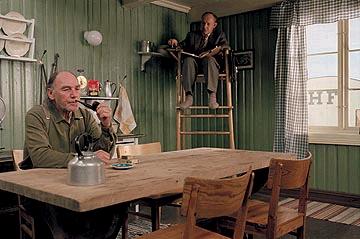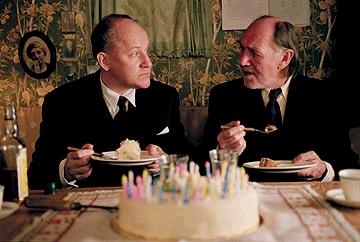

The delightful Kitchen Stories was Norway's submission for the 2004 Academy Awards. It didn't make the cut but it's still a delightfully understated movie. It hails from the same country as another buddy comedy, the Oscar nominated Elling, but feels more akin to Denmark's minimalist The Man Without a Past, which did garner a nomination last year. Maybe it is something in the water over in the Scandinavian area. The really interesting thing about Kitchen Stories is that it has two distinctive parts to it, each with its own thematic stylings. The first, and better half, is a bizarre game of one-upsmanship, and the second is a gentle story about becoming friends.
It's shortly after World War, II, and the Swedish are conducting experiments on how to be most efficient in the kitchen. They already strapped odd-looking contraptions on women, to see how and what they use in a kitchen. From this, they were able to design a kitchen that maximized efficiency for women. Their new target is single men, and they decide to go into neighboring Norway to observe. In order to facilitate this, an impartial scientist is sent to observe a subject. This means sitting in a ridiculously high chair (see above right) and taking copious notes on everything the subject does. Well, one of the interpretations of the Heisenberg Uncertainty Principle states that by observing an experiment, the experimenter changes the outcome, and that soon becomes the case with Folke (Tomas Norstrom, Bit by Bit, Anyway, He's Definitely Dead). He is sent to observe Isak (Joachim Calmeyer, Kransen, Dreamplay), who is basically a grumpy old man.
To say that Isak is averse to interaction is putting it mildly. He instantly regrets signing up for the experiment, and does what he can to make Folke's job miserable. Usually this means turning off the lights and leaving whenever Folke begins to record something. Folke retaliates by become more intrusive in his observations, and each try to play little mind games with each other. There is a minimum of conversation and the action is sometimes slow, but it is wonderfully subversive how the two of them try to get the better of the other. Writer/director Ben Hamer (Water Easy Reach, Eggs) and co-writer Jorgen Bergmark (A Love Affair) deftly set things up almost along the lines of a silent comedy. Every movement has a purpose, and they do things slowly and deliberately for maximum effect.
Soon, Isak and Folke come to a point where they cannot do much more to each other, and Hamer deftly changes the film into a story between two lonely people. The two begin to talk, and find that they really enjoy each other's company. This does ruin Folke's experiment, but he also realizes that there are things more important than his job. And unlike most other films, Hamer is able to show the progression of the two's friendship, from their tentative initial attempts at conversation to later, comfortable interactions. One of the elements that make their friendship a tad more unlikely is likely to fly over the heads of many. In the War, Norway and Sweden were not on the same side (well, one was actually on a side and the other was neutral). There is a sense of mistrust between the two men because of this, something they are able to overcome once they get a better sense of the other. Then, inexplicably, Hamer is again able to shift the mood to one of poignancy, but again, he makes the transition seamless. Everything feels fluid and natural. It's hard to say whether Kitchen Stories deserved a nomination since four of the five nominees has yet to be released, but this is certainly better than some of recent junk that Belgium has received nominations for.